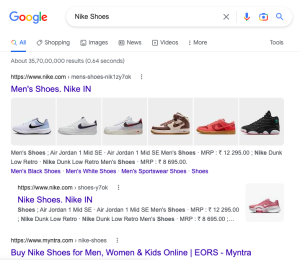SERP
SERP
Definition
SERP stands for “Search Engine Results Page.” It refers to the page a search engine displays in response to a user’s search query.
Description
It typically includes a list of web pages that the search engine has determined to be relevant to the user’s query, as well as other features such as advertisements, featured snippets, and related questions.

The order in which the pages are displayed on the SERP is determined by the search engine’s ranking algorithm, which considers various factors such as relevance, authority, and user experience. It is important because it is how users interact with search engines. When users enter a query into a search engine, they are presented with a SERP that shows them a list of web pages that the search engine has deemed relevant to their question. As such, it plays a critical role in determining which websites and content are discovered by users searching for online information or resources.
For businesses and marketers, understanding how to optimise their content for SERP ranking is vital to the SEO (Search Engine Optimization) strategy. By optimising their content to appear higher in search engine results, businesses can increase their visibility, drive more traffic to their website, and ultimately improve their bottom line.
Importance of SERP
It is important for several reasons:
- Visibility: The SERP is the primary way that users interact with search engines, and appearing on the first page of search results can significantly increase a website’s or business’s visibility.
- Traffic: Being highly ranked on it can also drive more traffic to a website, as users are more likely to click on the top results displayed on the page.
- Credibility: Websites that appear higher in search results are often seen as more credible and authoritative by users, which can help to build trust and establish a strong reputation.
- Business success: For businesses, appearing higher in search results can translate into more leads, sales, and revenue, making it a critical factor in overall business success.
- Competition: As more and more businesses move online, competition for search engine rankings is becoming increasingly fierce. Therefore, understanding how to optimise content for SERP ranking is essential for businesses looking to remain competitive in their industry.
How to rank higher on SERP?
Ranking higher on it can be a complex process that requires a combination of technical SEO, content optimization, and off-page factors. Here are some strategies to help improve your SERP rankings:
- Conduct keyword research: Identify the keywords and phrases your target audience is searching for and incorporate them into your content in a natural and relevant way.
- Optimise on-page content: Ensure your website’s content is well-written, informative, and relevant to your target audience. Use header tags, meta descriptions, and title tags to optimise your content for search engines.
- Improve website structure: Make sure your website is organised and easy to navigate. Ensure that pages are interlinked, load quickly, and are mobile-friendly.
- Build quality backlinks: Establishing links from reputable websites to your website can help to boost your website’s authority and relevance in the eyes of search engines. Focus on acquiring quality backlinks through guest posting, blogger outreach, and social media engagement.
- Optimise for local search: For businesses with a physical location, optimising for local search can help improve visibility in local search results. This can be done by optimising your Google My Business listing, building local citations, and including local keywords in your content.
- Stay up to date: Stay updated with changes to search algorithms and best practices for SEO. This ensures that your website stays optimised for SERP rankings.
SERP Future Trends
Several emerging trends are likely to shape the future of SERP:
- Voice search: With the increasing popularity of voice assistants like Amazon Alexa and Google Home, voice search is expected to become more prevalent. This will change how people search for information and require businesses to optimise their content for voice search.
- Featured snippets: Featured snippets are becoming more common in it, providing quick and concise answers to user queries. Optimising featured snippets can help businesses gain more visibility and increase click-through rates.
- Personalization: Search engines are becoming more adept at understanding user intent and delivering personalised search results based on their search history, location, and other factors. This will require businesses to create content tailored to their target audience and specific needs.
- Mobile-first indexing: As more people use their mobile devices to access the internet, search engines prioritise mobile-friendly websites in their rankings. Businesses prioritising mobile optimization will have a better chance of ranking higher on SERP.
- Visual search: With the increasing use of optical search engines like Google Lens, businesses must optimise their images and videos for search engine indexing. This will require firms to use descriptive file names, alt tags, and other metadata to help search engines understand the content of their visual media.
Benefits of SERP
There are several benefits for both users and businesses:
Benefits for Users:
- Relevant results: It provides users with relevant and accurate results based on their search queries, making finding the information they need easier.
- Quick access: It provides users immediate access to various sources, including websites, images, videos, and news articles.
- Improved user experience: Using featured snippets and other features, it can provide users with a more seamless and intuitive experience, reducing the time and effort required to find the needed information.
Benefits for Businesses:
- Increased visibility: Ranking high on SERP can significantly increase the visibility of a business or website, making it easier for users to find and access their content.
- More traffic: I can drive more traffic to a website, resulting in increased leads, sales, and revenue for businesses.
- Credibility: Higher rankings on SERP can help establish a business as a credible and authoritative source of information, which can build trust with users.
- Competitive advantage: By optimising for SERP rankings, businesses can gain a competitive advantage over their competitors, making attracting and retaining customers easier.
Example
Nike, a well-known global sports brand with a strong online presence that regularly appears at the top of the SERP for relevant keywords.
When someone searches for “Nike shoes” on Google, the top results are typically Nike’s website and other online retailers that sell Nike shoes. Nike has optimised its website and content for relevant keywords and established itself as a credible and authoritative source of information and products related to sports shoes.

Nike also appears in featured snippets for specific queries, such as “best Nike running shoes,” which helps to increase visibility and drive traffic to its website.
FAQ
What does SERP stand for?
SERP stands for Search Engine Results Page.
What is a SERP?
A SERP is the page that appears in response to a user’s search query on a search engine like Google, Bing, or Yahoo.
Why is SERP important?
SERP is important because it helps users find the information they need quickly and efficiently while also allowing businesses to increase visibility, drive traffic, and achieve their goals.
How can businesses rank higher on SERP?
Businesses can rank higher on SERP by optimising their website and content for relevant keywords, creating high-quality and engaging content, building backlinks from reputable sources, and staying up to date with the latest SEO trends and best practices.
What are some emerging trends in SERP?
Some emerging trends in SERP include voice search, featured snippets, personalization, mobile-first indexing, and visual search.
What are the benefits of SERP for businesses?
The benefits of SERP for businesses include increased visibility, more traffic, credibility, competitive advantage, and potential for increased leads, sales, and revenue.
What are the benefits of SERP for users?
The benefits of SERP for users include relevant results, quick access to various sources, improved user experience, and quick and easy access to information and resources.
Can businesses pay to rank higher on SERP?
While businesses cannot pay directly to rank higher on SERP, they can use paid search advertising such as Google Ads or Bing Ads to appear at the top of the page for relevant keywords.





We would love to have your opinion.